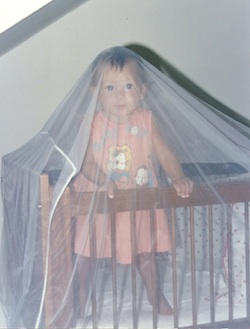
Gabriella, a long time friend of Expatclic, after years of living in Africa, gives us some very useful pieces of advice in case you have to face a hard relocation.
Those who have already had an experience of this kind know that hard relocation refers to a period spent in a poor country, typically in sub-Saharan Africa, East Asia or South America, with very poor sanitary conditions and a climate that fosters the spread of diseases and insects.
If you have lived in such a country you know that you have to be prepared for the worst, which does not mean to be pessimistic, but only that you should be prepared to deal with some health emergencies, large or small, to avoid unpleasant consequences; sometimes just use a few tricks to make the stay more livable with, and to ensure that such an expatriation gives you a wonderful time and, above all, the most interesting and exciting memories of your life.
If you are leaving for the first time, before departing consult the websites for public information and indications about health conditions in such countries. Search Expatclic also, and head down to your local health unit, see your doctor, and proceed with vaccinations and prophylactic applications, both mandatory (usually yellow fever, typhoid, cholera) and those recommended (hepatitis A, meningitis, tetanus, malaria), even if they seem excessive.
Remember that one of the worst and most common scourges for those coming to hot and humid areas is the malaria parasite Plasmodium, carried and injected into humans by mosquitoes: one bite from an infected mosquito can pass on the disease, for which there is no vaccine yet, but only a prophylaxis based on chloroquine. Malaria can lead to death, so follow the advice and instructions of the pharmaceutical industry, especially with regard to children, if you are pregnant or breast-feeding, and also take all necessary measures to avert the danger of being bitten: put mosquito nets on doors, windows and above the bed ( there are also models for cots and beds with bars), do not go out just after sunset, the worst time for the amount of mosquitoes around, spread repellent like Autan all over your body, and if you do outdoor physical activity (the classic jogging or a tennis game), repeat the process several times; at home keep a cool, dehumidified environment and do not turn on the light with open windows or doors; administer chloroquine regularly to your children (depending on the dose specified by the doctor): it can be taken in the form of syrup, which for the smallest ones can be, for example, mixed with milk and biscuits into the bottle. Be careful at the first symptoms, fever, sweating and weakness, and go to the doctor immediately, who in endemic areas will be familiar with the signs and able to diagnose the infection and intervene rapidly.
Another danger to our health are parasites such as worms, which in various ways, penetrate and proliferate in the body, attacking vital parts of the organs. In particular, the heartworm diseases are caused by worms called filariae, transmitted by the bite of insects; skin filariasis is transmitted by the “mango fly“, a species of horsefly very common in Central African areas and in other countries in the equatorial zone. The fly deposits the heartworm larvae on soft and wet surfaces, such as linen or wet sand, and if humans come in contact with them these larvae can creep under the skin, completing their growth and penetrating deeper and deeper. At the point of penetration you may see an itchy rash, like a pimple, and when the small worm develops, it often becomes visible, and you just need a little medical intervention to remove it completely and disinfect the affected part (a little like what you do with ticks … ).
Inquire about whether your host country is prone to this problem, and if so avoid any risk; do not hang your laundry outdoors, but use a closed dryer; do not sit on wet towels when you are at the beach or in the pool, do not walk barefoot in wet sand, and especially check every day your body and that of your children, especially under the nails of hands and feet, between the folds of the skin near the mouth and eyes.
Intestinal worms are parasites of various sizes. In the collective imagination they are only an element in poor countries, the result of poor personal hygiene and poor economic conditions, but in fact these infections are spread, though in a limited way, in European countries, too; just think of the pin worm that in childhood affects a part the child population.
The precautions are well known: wash your hands and those of the children, prevent them from bringing dirty objects to their mouth, disinfect fruits and vegetables with antiseptic, drink only bottled water and use it for brushing your teeth and making ice cubes, in short, be careful of what you putin your body.
These precautions will also defend against other intestinal parasites, such as amoeba, which is not a worm but a protozoan. The worm larvae Ancylostoma Duodenal instead penetrates through the skin (especially hands and feet) in contact with soil contaminated by faeces of infected animals, so once again, avoid walking barefoot, and if the child “crawls” wash the floor daily with disinfectants. Always check your stool and the child’s and as well in any at-risk situations, follow a preventive therapy, according to the advice of the physician.
 Other unwelcome creatures but much less dangerous, are rats, cockroaches and ants; you do not need medicine to defend from them, but only a healthy environment and some little “tricks”: seal all the cracks between the tiles along the walls, under doors, around the pipes of air conditioners and sanitary components in toilets, place traps in the kitchen, out of the reach of children, and if you do not have pets, sprinkle powder or spray insecticide; if you live in a house keep pits or other black pipes clean, do not leave food or garbage uncovered, and in the most severe cases, or if you fear the night, besides mosquito nets you can line the legs of beds with double-sided tape or flypaper, so that the insects remain stuck and can not go up. But this trick is really the last resort, it should not be needed unless perhaps for purely psychological reasons.
Other unwelcome creatures but much less dangerous, are rats, cockroaches and ants; you do not need medicine to defend from them, but only a healthy environment and some little “tricks”: seal all the cracks between the tiles along the walls, under doors, around the pipes of air conditioners and sanitary components in toilets, place traps in the kitchen, out of the reach of children, and if you do not have pets, sprinkle powder or spray insecticide; if you live in a house keep pits or other black pipes clean, do not leave food or garbage uncovered, and in the most severe cases, or if you fear the night, besides mosquito nets you can line the legs of beds with double-sided tape or flypaper, so that the insects remain stuck and can not go up. But this trick is really the last resort, it should not be needed unless perhaps for purely psychological reasons.
The picture presented so far is not very encouraging, and in many countries, unfortunately, it represents normality, but do not be afraid: basic knowledge and a little experience will allow you to fully enjoy your stay in “difficult” but really fascinating countries, and soon everything will become a daily routine; but from someone with thirty years of practice in martial arts, let me tell you do not EVER lower your guard, especially when your enemy is very small, almost invisible…




